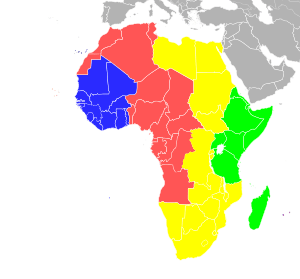Time in Morocco facts for kids
Morocco is a country located in North Africa. It uses a special time called Central European Time (CET). This means it is one hour ahead of Coordinated Universal Time (UTC+01:00) every day of the year. Morocco has been using this time since October 26, 2018. Before that, the country often changed its clocks for something called daylight saving time.
Contents
Understanding Time Zones
A time zone is a region that uses the same standard time. This helps people around the world know what time it is in different places. Time zones are usually measured by how many hours they are ahead or behind Coordinated Universal Time (UTC). UTC is like the world's main clock. For example, if a country is UTC+01:00, it means their time is one hour ahead of UTC.
What is Daylight Saving Time?
Daylight saving time (often called DST) is when clocks are moved forward by one hour during warmer months. This makes evenings feel longer because the sun sets later. When the cooler months arrive, clocks are moved back one hour. The idea is to use less electricity by making better use of natural daylight. Many countries around the world have used DST, but some have stopped.
Morocco's Time Zone Journey
Morocco has changed its time zone and used daylight saving time many times throughout history.
Early Changes
Morocco first tried using daylight saving time in 1939 and 1940. It used it again in 1950. After that, it returned in 1967 but was stopped again. It came back in 1974 and was used until 1978. For a while after 1978, Morocco used Western European Time (WET), which is the same as UTC (UTC+00:00), all year round.
In 1984, Morocco switched to Central European Time (CET), which is UTC+01:00. But then, in 1986, it went back to Western European Time.
Recent Changes and Stopping DST
In 2008, Morocco started using daylight saving time again. For several years, the dates for starting and ending DST changed. For example, in 2008, DST started on June 1st and ended on September 1st. In 2012, Morocco changed its rules for DST. It would start on the last Sunday in April. There was even a pause during the holy month of Ramadan, and it would end on the last Sunday in September. In 2013, the end of DST moved to the last Sunday of October, following a similar schedule to many European countries.
However, in 2018, Morocco decided to stop using summer time completely. Instead, the country chose to stay on Central European Time (CET) (UTC+01:00) all year long. This was the first time Morocco had used CET consistently since 1984. This change means that people in Morocco no longer need to adjust their clocks twice a year.
 | Anna J. Cooper |
 | Mary McLeod Bethune |
 | Lillie Mae Bradford |


